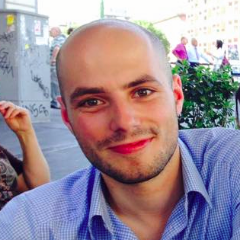Take Poulenc's monologue for soprano and orchestra La voix humaine. Pair it with Mascagni's one-act Sicilian tearjerker Cavalleria rusticana then schedule the talented conductor Michele Mariotti alongside Italian theatre's latest enfant terrible Emma Dante. On paper, this was a tantalising operatic package. In practice, it was musically and dramatically first rate.
Bologna's Teatro Communale currently offers one of the best seasons around in Italy. The range of titles is imaginative and often superbly cast. And, now more than ever, Mariotti is applying his exciting conducting style as principal conductor to repertoire beyond that of bel canto and early Verdi − his traditional areas of expertise. This unusual La voix-Cav diptych (the latter component of which is most often coupled with Leoncavallo's Pagliacci) was a case in point.
One wonders why Dante's concept, which explores the plight of women crushed by romantic catastrophes, is not done more often. The curtain opens on La voix humaine, as the protagonist reclines on a bed. Three dancers gracefully illustrate her reveries, representing her former lover, her rival for his heart and the protagonist herself. Soon after, we watch as her mind unravels.
Poulenc's 1958 opera, based on Jean Cocteau's 1928 monologue, charts the demise of the protagonist as she speaks on the phone with the man that has broken up with her. Dante adds another psychological layer, slowly revealing that the dancers are products of her hallucinatory experiences. Nurses march onstage to restrain the protagonist, and, when her chic apartment is reconfigured, becoming more claustrophobic, we realise that the padded walls form part of a psychiatric ward.
The text is the most difficult thing about this exposed vocal role, and Anna Caterina Antonacci gave a dynamic and subtly crafted delivery. Her especially desperate rendition – the phone remains unplugged for the most part, the conversation taking place solely within her head – makes the character's demise all the more moving. Mariotti might have provided more colour for the score's snarling passages, or more ardour when romantic abandon is required, but for the sections which Poulenc draws in soft-grained pastel colours, the conductor conjured an intoxicatingly transparent sound.
This production of La voix matches the score for finesse. That for Cavalleria rusticana has a more visceral quality. Dante, from Sicily, deconstructs and reassembles Mascagni's picture postcard opera like you feel only a Sicilian can (the composer himself was from Tuscany) by stripping the stage to its bare essentials. Singers wear black trousers and shirts. The dark expanse of the stage, dramatically lit, features little more than the three moveable staircases representing the village square. Here, Dante's rigorous direction of the cast − a meditation on Sicilian theatricality ("in Palermo one does not perform actions; one puts on ceremonies", she has said) − bursts to life. Lingering gazes from the female characters communicate the blend of sorrow and eroticism familiar from Neorealist films set in the South.
Tragedy goes hand in hand with comedy, so that, when women open fans, transforming the stage into a sea of colour, male admirers spiral and topple like spinning wheels. We knew about Dante's preoccupation with the human physique from Bestie di scena − her play featuring no dialogue and a cast in the nude − which closed at Milan's Teatro Piccolo last month. Here, singers punctuate their lines with gestures laden with intensity.
Highly-charged religious imagery proves to be this production's most powerful element. An actor in a loincloth drags a cross across the stage, his muscles quivering with tension. Elsewhere, illuminated crosses float down in ones, twos and clusters (more humour amidst the piety). When Turiddu is murdered, his mother's grief-stricken pose resembles one of Antonello da Messina's Madonnas. Mascagni's intermezzo provides the backdrop for another piece of powerful physical theatre. The cross-bearing actor returns and collapses for a third time (Dante repeats visual sequences to form a patchwork of physical motifs). Santuzza helps him to his feet, attaching his cross to guide ropes before it floats off. Liberated, he quietly enters his home.
Mariotti's conducting provided what he lacked in La voix for heart-on-sleeve yearning, applying a luxurious rubato to a rich orchestral sound. Marco Berti's bright and powerful voice was a good match for this barbaric Turiddu, and Gezim Myshketa as Aflio, Claudia Marchi as Lucia and Anastasia Boldyreva all delivered fine renditions. Mezzo Carmen Topciu as Santuzza was the standout performance: her voluptuous voice, rich in overtones, has real interest, and she is a powerful actor to boot. One can hear her namesake (as conceived by Bizet) knocking at her door.




